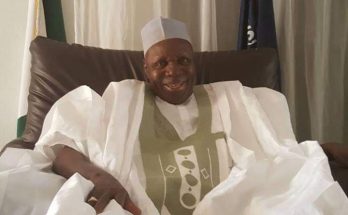The National Bureau of Statistics (NBS), Nigeria’s custodian of economic data, has a penchant for kicking up storms with controversial methods of data gathering that result in misleading conclusions about the nation’s economic health.
In March 2022, NBS data showed Nigeria’s inflation rates in a steep decline when the naira was taking a precipitous nose-dive in the foreign exchange market and commodities prices were heading for the stars.
Bismarck Rewane, an accomplished monetary economist, wondered why Nigeria’s inflation rates should be declining when inflation in the U.S. and Britain had climbed to 5 and 3.5 per cent respectively.
“Why is Nigeria’s inflation falling when the naira has crashed to an all-time-low (N580/$), diesel is being sold at N350/liter and commodity prices are surging”, Rewane queried.
NBS maintained a deafening silence over the controversy. Time swept it away.
Last week NBS did it again. This time, the nation’s alarming unemployment figure was at the centre of the storm.
In 2020 Nigeria had the world’s second highest unemployment rate after Namibia. NBS had rolled out data showing Nigeria’s unemployment rate at an alarming 33.3 per cent.
After the release of the devastating unemployment figure which sent shivers down the spines of every Nigerian, it took the NBS some three long years to update the figure.
There were claims outside NBS that the agency was starved of funds and could not gather the data to update the nation’s unemployment figures.
Last week NBS subjected Nigerians and the entire world to a shock treatment. It adopted a new method of data gathering that shows Nigeria’s unemployment rate tumbling from 33.3 per cent in 2020 to 4.1 per cent in the first quarter of 2023.
Yemi Kale, NBS immediate past statistician-general was the first to query the efficacy of the new method of measuring unemployment in Nigeria’s economic environment.
Kale contended that he resisted the temptation to use that system for 10 years during his tenure. He wandered why NBS fell for it hook, line and sinker.
NBS new method of measuring unemployment has turned the lazy and corrupt men who run Nigeria’s economy in the last eight years to miracle workers.
It suggests that they managed to drive down Nigeria’s alarming unemployment rate by well over 29 per cent in less than three years. If that was the truth, the World Bank would have been the first to celebrate Nigeria’s achievement.
The bank would have gleefully announced Nigeria’s exit from the inglorious club of poverty stricken nations.
Ironically, Nigeria clung tenaciously to its notorious position as the country with the highest number of extremely poor people in the world, even as NBS claimed it performed an economic miracle in job creation.
NBS unemployment rate stands economic logic on its head. Unlike exchange and lending rates which always move in opposite directions, poverty and unemployment rates move in the same direction.
The rate of poverty rises when unemployment rises. It drops when unemployment climbs down. In fact, poverty is the direct consequence of rising unemployment.
People slip into poverty when they are thrown out of jobs. They climb out of poverty when they regain their source of income.
NBS unemployment data places Nigeria’s economy at war with that indubitable conclusion. It suggests that millions of jobs were created in the last three years while 140 million Nigerians remain in abject poverty.
Ironically, NBS is yet to reverse itself on the number of Nigerians wallowing in abject poverty. Nigeria’s custodian of economic data recently told the world that there are 133 million Nigerians in abject poverty. The enigmatic crash in unemployment rate ominously left the poverty rate unchallenged.
The World Bank added seven million more to the poverty figure when President Bola Ahmed Tinubu delivered a pre-emptive strike on petrol subsidy on May 29, 2023.
The World Bank commended the president’s courage in removing the highly abused subsidy but warned that the action would push seven million Nigerians down poverty line since there were no palliatives to cushion the effect of the burgeoning inflation on the populace.
The World Bank’s position takes the number of Nigerians in abject poverty to a record 140 million in a population of 216 million.
NBS new unemployment figure is curiously silent on the effect of the bumper harvest in job creation on an embarrassing poverty rate that makes a highly endowed economy like Nigeria the world headquarters of poverty.
Again, it is extremely difficult to ignore the fact that NBS new system of measuring unemployment is not in congruence with Nigeria’s economic environment.
NBS argues that it uses one hour of work rather than the previous yardstick of 20 hours per week to determine gainful employment. It claims that the U.S. uses the same system.
Minimum wage in many states in the U.S. is $15 per hour. At the current parallel market rate of N920 to the dollar, that amounts to N13, 800.
That is the monthly pay of many Nigerian graduates teaching in private secondary schools who are regarded as employed. But that figure is restricted to the U.S. Even with food inflation surging at 25 per cent, Nigeria’s minimum wage remains embarrassingly low at N30, 000 per month. When divided by 22 working days in a month, Nigeria’s minimum wage amounts to N56.8 per hour.
That is what NBS passes as gainful employment in its new method of measuring unemployment.
In adopting the new system of measuring unemployment NBS inauspiciously ignored the fact that N56.8 cannot buy a cup of garri.
The consequence is disastrous. NBS has sent a misleading message to Nigeria’s complacent rulers. They would be beating their chest that Nigeria’s unemployment rate is almost at par with America and Britain.
For unemployment to crash from 33.3 to 4.1 per cent in three miraculous years, the economy would have been growing at a minimum of 12 per cent per annum.
Ironically, Nigeria’s economic growth was just above 2 per cent of gross domestic product (GDP). NBS unemployment figure is catastrophically duplicitous.




